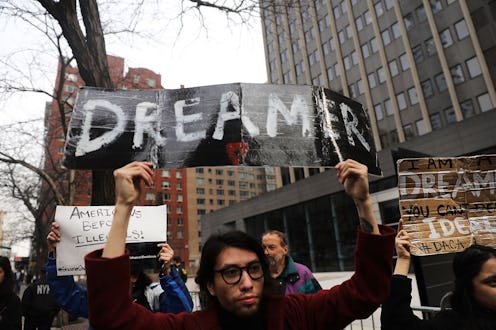News
The DACA Deadline Is Today — Here's Whats Actually Happening To Dreamers

Monday was supposed to be the day of reckoning for hundreds of thousands of Dreamers across the country. The Deferred Action for Childhood Arrivals (DACA) program was to end March 5. But it's still very much in effect. Here's what's going on, despite the Trump administration's plans to end the program.
Rewind back to September. The attempts to end the program were made by the Trump administration and announced by Attorney General Jeff Sessions. He announced that there would be six months for a "wind down," and then the program would end in March. Sessions said that Congress could replace the program — an Obama-era executive order — with some sort of immigration law.
"This will enable DHS to conduct an orderly change and fulfill the desire of this administration to create a time period for Congress to act — should it so choose," Sessions said while announcing the end of the program in September. "We firmly believe this is the responsible path."
Trump also urged Congress to act. "Congress now has 6 months to legalize DACA (something the Obama Administration was unable to do). If they can't, I will revisit this issue!" Trump wrote on Twitter in September, shortly after Sessions' announcement.
That hasn't happened. Congress has made little to no progress on legislation to protect Dreamers. Neither Senate Majority Leader Mitch McConnell nor House Speaker Paul Ryan will bring up a clean Dream Act for a vote. Instead they have pushed "compromise" immigration bills with measures appealing to the GOP like funding for Trump's border wall. Those have all failed.
But meanwhile the "wind down," as Sessions called it, has not progressed. Nearly each and every deadline put in place by the administration has been pushed back because the courts have stepped in on DACA recipients' behalf.
Due to a January injunction issued by U.S. District Judge William Alsup in San Francisco, renewals must still be accepted by U.S. Citizenship & Immigration Services. The Trump administration tried to bypass the appeals process and have the injunction overturned by the Supreme Court, but the court denied the request.
The Department of Justice was disappointed by the decision, which protects the current DACA recipients until the appeals courts make their decisions, likely around June, immigration attorneys said. The DOJ spokesperson said the ultimate outcome could be in their favor as they seek a ruling against the Dreamers.
"We will continue to defend DHS' lawful authority to wind down DACA in an orderly manner," Department of Justice spokesman Devin O'Malley said in a statement.
Now, the stalemate in Congress and the court injunction looks likely to remain the state of play until the appeals courts rule on DACA. Then it could still be up to the Supreme Court to decide the issue further prolonging the legal limbo for many young people.
Those currently at risk are not those who have had their statuses granted, but rather those who never applied for the program and thus are ineligible for renewal. Some weren't old enough to apply and others may have opted not to, fearing the administration could use the contact details from the form to later find and deport them. Others fear deportation while waiting on renewals to be processed.
"We're worried that people are going to forget about the Dreamers and that while no one is paying attention, the administration will start quietly deporting them," the American Civil Liberties Union national political director, Faiz Shakir, told The Guardian.
Activist Dreamers and groups like the ACLU plan to keep pushing Congress to act, but the lack of urgency around DACA ending hasn't helped.